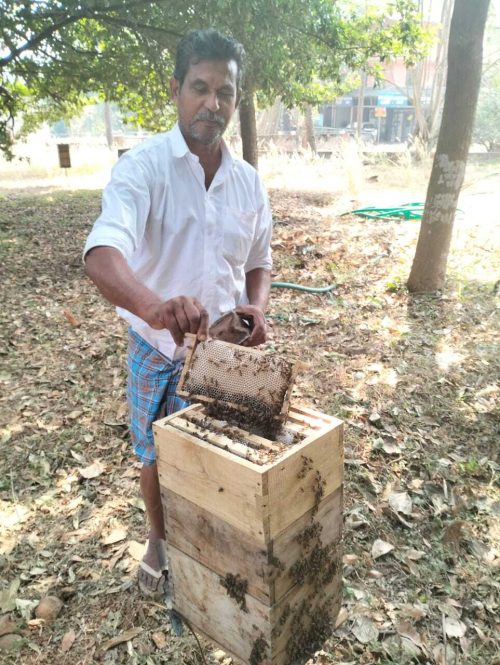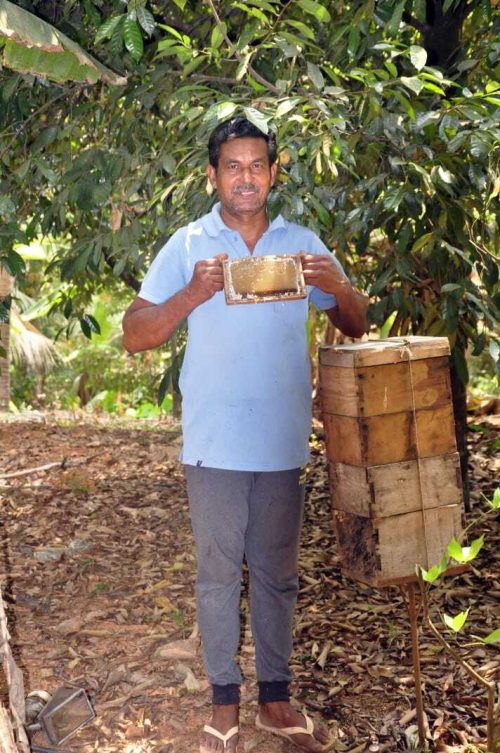“The biggest lesson is to keep going. There is nothing stronger than a person’s strength of will and determination. If you keep moving forward, success will follow,” R Vishwan from Kerala shares one of the most important learnings from his life.
Once forced to steal food out of hunger, Vishwan, a honey farmer, now earns over Rs 25 lakh a year from his farm. He says he is happiest where he stands today. Harvesting over 6,000 bee boxes and producing 90 to 110 tonnes of honey annually, he feels life is “kind” to him now.
However, his fortunes only turned around in recent years. In a heart-to-heart conversation with The Better India, he shares how he discovered honey farming, which turned his life around.
Journey from hunger to honey
Vishwan, born in the small village of Neyyattinkara in Thiruvananthapuram district, Kerala, says he had a peculiar childhood. “In the village, people were quite superstitious back then, and some remain so even today. Some astrologers had told my parents that I would bring bad luck to our family,” he shares.
This rumour had profound effects not only on his family but also on the entire village. As a result, he wasn’t even allowed to play with other kids. Things took a turn for the worse when his father’s business began to suffer sudden losses. “My family migrated to Nilambur in Malappuram district, and I was blamed for this misfortune. At just seven years old, my family abandoned me, leaving me on the streets to fend for myself,” he says.

Left with no other options, he resorted to stealing food and living in treehouses built to observe animals that destroyed crops at night — all this during the 1970s. “I would have never stolen anything but I had to. I have only stolen food items, that too due to unbearable hunger,” he recalls.
One time, he got caught while stealing, but the owner was a kind man. “When I explained that I stole because of hunger and I had no one to care for me, the man asked him to graze his cattle and gave him 15 paise per day as a wage,” he says.
While grazing cattle in the forest areas of Nilambur, he noticed honeycombs and honey bees for the first time. Soon, those honeycombs became a source of filling his stomach. “When I was hungry, I collected honey and drank it. Of course, I would get bitten sometimes, but hunger is your greatest shield at such times. One of those days, I thought, ‘Why can’t I keep them, then I won’t have to wander around to find the honeycombs?’”
He went to a nearby shop and got a wooden box that was used to keep tomatoes for free. “I kept the honey bees inside it. That was the beginning of it all. Without knowing any scientific methods of keeping honey bees or collecting honey, I just dived into it due to sheer necessity,” he shares.
He continues, “I initially burnt the honeycomb to collect honey. I got a tin full of honey and went to Kozhikode to sell it. I was only 13 years old at the time,” he says.
He sold the honey to the Kozhikode Sarvodaya Sangham under the Kerala Khadi Board for only Rs 328. “I still sell a portion of my produce to the institution,” he says.
The ins and outs of honey farming
Having accidentally stepped into the world of honey farming, Vishwan learnt along the way. “I was not an expert and did not know anything about farming. My initial investment was only Rs 328 — the money I got from selling my first-ever batch,” he says.
Believing that it was destiny and the work of god to introduce him to honey farming, he says, “I didn’t have any worldly experience or formal education. There was no one to help me. Had I not found out about this occupation, I’m not sure what I would have done. Honey was the only kind of farming that required the least amount of capital. All other kinds of farming required lots of land, which I didn’t own.”
When discussing the process of beekeeping and honey farming, Vishwan explains the entire process in detail.

“This year’s harvesting season just ended in May. Now, during the monsoon season, the next five months are dedicated to rearing the bees, essentially taking care of them. I give a sugar solution to the bees because if they don’t get food during the rains, they abandon the comb and go away. Bees keep honey for the monsoon time, and we take that, so they won’t have anything to eat. Special attention must be given to keeping them dry by wrapping them with plastic covers,” he informs.
October-November is the time of growth for the bees, he adds. “During this period, we need to divide the boxes and feed the bees until December. February, March, and April make the harvest/income season in Kerala. During the harvest season, honey can be collected every eight days.”
Currently, he has 6,000 beehive boxes and harvests 90 to 110 tonnes of honey yearly. “After all expenses like labour, vehicle, etc, I earn a profit of Rs 25 to 30 lakh annually,” he informs.
Sharing a word of advice to aspiring honey farmers, he says, “Beekeeping requires a lot of attention, especially to the queen bees. If it rains during January and February, which marks the beginning of the harvest season, it affects the business. So make sure your bees are well and ready for the season. Additionally, there is no government support in the form of subsidy, so you will have to build everything from scratch,” he says.
Vishwan currently sells the harvested honey to the Kerala Khadi Board and pharmaceutical companies in Chennai and Bengaluru. As for the future, Vishwan wants to go beyond farming. “I want to help other people like me to get into honey farming. I am keen and ready to train anyone who wants to farm honey,” he shares.
Edited by Pranita Bhat
No comments:
Post a Comment